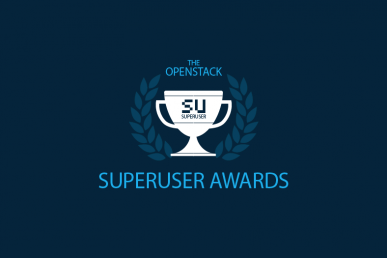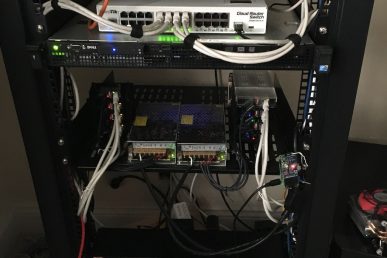It’s time for the community to help determine the winner of the Open Infrastructure Summit Shanghai Superuser Awards. The Superuser Editorial Advisory Board will review the nominees and determine the finalists and overall winner after the community has had a chance to review and rate nominees.
Now, it’s your turn.
The InCloud OpenStack Team is one of five nominees for the Superuser Awards. Review the nomination below, check out the other nominees and rate the nominees before the deadline October 8 at 11:59 p.m. Pacific Daylight Time.
Rate them here!
Who is the nominee?
InCloud OpenStack Team is comprised of over 100 members who developed a OpenStack-based private and hybrid cloud platform, a smart cloud operating system designed for the next generation of cloud data centers and cloud-native applications.
It consists of four sub-teams:
- Product design: requirement analysis and interaction design
- Product architecture: solution design and technology research
- Product development: feature design and implementation
- Operations support: deployment, troubleshooting.
As a Gold Member of the OpenStack Foundation, Inspur is actively involved in OpenStack community. Team members include Kaiyuan Qi, Zhiyuan Su, Brin Zhang, Guangfeng Su.
How has open infrastructure transformed the organization’s business?
InCloud OpenStack is committed to transforming into a new type of cloud service provider for the government. InCloud OpenStack has ranked first in the government cloud market for five consecutive years. At present, we have provided government cloud services to more than 80 government units in mainland China. We use OpenStack to build a mixed cloud environment for our customers to achieve 100% of traditional and native cloud applications. The government cloud based on OpenStack reduces the online time of customer’s application system from 6 months to less than 1 week, saves 45% of the server input for customers and reduces 55% of the operation and maintenance costs. Currently, InCloud OpenStack has providing cloud services for more than 100,000 cloud users.
How has the organization participated in or contributed to an open source project?
As a Gold Member of the OpenStack Foundation, Inspur is actively involved in OpenStack community and is committed to being the top practitioner of OpenStack, supporting successful deployments in various industries, sharing the optimization and experience of large-scale deployment at the Austin and Denver Summits, OpenStack China Days, OpenStack China Hacker Loose Activities, and Meet Up technology exchange.. Inspur is an OpenStack Foundation Gold Member, a member of CNCF, Linux Foundation, a core member and founding member of ODCC, OCP, and Open19. Inspur is actively involved in the open source community and is committed to being the top practitioner of OpenStack, commit: over 58 items, and reported over 41 bugs or issues in the OpenStack project.
What open source technologies does the organization use in its open infrastructure environment?
All of Inspur Cloud’s development and CI/CD tools are built using open source technologies, including, but not limited to: Chef, Ansible, Terraform, OpenStack, ELK, Kafka, Docker, Kubernetes, Jenkins, GO, keepalived, ETCD, Grafana, Influxdb, Kibana, Git, OVS, etc.
What is the scale of your open infrastructure environment?
Inspur public cloud and government cloud platforms adopt a variety of technical architectures and have a large overall scale. At present, they are migrating to OpenStack in the continuous exploration framework. At present, the size of clusters that have applied OpenStack is 5000+ nodes, which will grow rapidly in the future. Currently, the government cloud has provided 60,000+ virtual machines, 400,000+ vcpu, 30P+ storage for users, and hosts 11,000+ online applications. Inspur Cloud is building opscenter tools based on Kubernetes and unified region management. At present, the number of Kubernetes PODs is more than 5,000 (after LCM migration project is launched, it is expected to reach 30,000+). Wave cloud Devops cloud provides CI/CD environment for more than 10,000 developers.
What kind of operational challenges have you overcome during your experience with open infrastructure?
OpenStack’s components depend on MQ. When the scale of cluster is large, MQ is the bottleneck of expansion. We use the mode of Nova cells V2 and dedicated MQ cluster to solve this problem. When the memory of virtual machine is large and the dirty data generated is faster than the transmission speed, the virtual machine migration fails. We use the features of postcopy and coverage to solve this problem.
Hardware heterogeneity and expansion flexibility are the pain points of cloud computing network. Inspur cloud network effectively solves the problem of flexible expansion of virtual network functions through self-research EIP cluster and secondary development of Neutron, and shields the heterogeneity of underlying devices through self-research cluster.
How is this team innovating with open infrastructure?
In order to solve the reliability of key components such as MQ and DB that OpenStack depends on, we developed a self-developed system to implement MQ/DB fault monitoring and automated recovery function.We support innovations such as virtual machine CPU and memory heat upgrade, virtual machine priority local resize, and encryption dog by modifying OpenStack’s code.
On the basis of open source OVS and OpenStack Neutron, its virtual network architecture adds key functions missing in open source systems such as network ACL, VPC peer-to-peer connection, hybrid VxLAN interconnection, EIP cluster and so on.
Inspur InCloud OpenStack 5.6 has completed a test with a single cluster size of up to 500 nodes, which is currently the largest single-cluster test based on OpenStack Rocky in the world.
Each community member can rate the nominees once by October 8 at 11:59 p.m. Pacific Daylight Time.
- Exploring the Open Infrastructure Blueprint: Huawei Dual Engine - September 25, 2024
- Open Infrastructure Blueprint: Atmosphere Deep Dive - September 18, 2024
- Datacomm’s Success Story: Launching A New Data Center Seamlessly With FishOS - September 12, 2024

)










